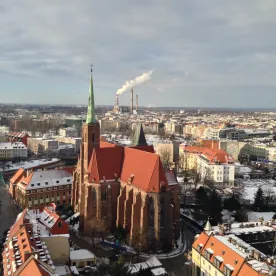On January 13, the European Commission applied for the first time a mechanism aimed at addressing threats to the rule of law in a Member State of the Union.
This mechanism had been adopted in 2014 having in mind certain measures taken by Hungary under Prime Minister Viktor Orban. But the dubious honor to inaugurate the so-called ‘Rule of Law Framework’ went to another member of the ‘New Europe’, Poland, where troubling initiatives were taken by the ‘law and justice Party’ in the months following its return to power after the legislative elections of October 2015.
1. A booming economy, growing twice as fast as the EU average
For the past decade, Poland has been the best success story of the European Union. It was the only Member State with continued economic growth throughout the financial crisis. Its GDP per capita based on purchasing power exceeded $24,000 and reached 65 percent of the EU level of income. The Polish economy grew by 3.3 percent in 2014 and is estimated to have grown by 3.2 percent in 2015. This growth was nearly twice as the average in the European Union.
Donald Tusk, head of the center right “Civic Platform” (PO) and Prime Minister during most of that period, was duly rewarded by being appointed President of the European Council of Heads of State and Government in 2014.
Nevertheless, in May 2015, voters chose as the new President of the country the candidate of the opposition Law and Justice Party (PIS) and gave this extreme-conservative, fundamentalist catholic and populist party an absolute majority in the new Parliament elected in October.
2. Why this dramatic change defying political logic?
PIS represents the ‘poor’ Eastern part of Poland. Its main argument for attracting voters was that the economic growth the country enjoyed in the last years went only to the middle class in the West of the country (close to Germany), neglecting the more agricultural – and more conservative – catholic East.
Another reason for the ruling PO’s ‘descent to hell’ is the scandal of leaked secret recordings of conversations in a restaurant that hit some of their most prominent leaders (including the brilliant former Foreign Minister Radek Sikorski). Civic Platform’s voters were genuinely shocked by the words used and the bluntness and cynicism of some of the statements. The leader of PIS Jaroslaw Kaczynski, being a recognized political genius, took advantage of these weaknesses to promote his party as the guardian of the ‘values’ of the country.
Last December’s election results also confirmed that Poland’s democratic system is not yet well rooted in society. Parties appear and disappear and the classic left/right balance is regularly challenged: the political parties on the left have lost all appeal and are not even represented in the new Parliament.
3. Who is leading the country?
What makes the new Polish political scene even more special is that the politicians elected are not necessarily those who make the political decisions. The real leader of the country since the end of last year is neither the President or the Prime Minister. It is the President of the Law and Justice Party Jaroslaw Kaczynski. Some commentators have gone so far as to say that he is the most powerful Polish leader since the end of the Cold War.
Kaczynski is responsible for crafting the strategy that has allowed his party to reach this extraordinary success. However, conscious that he is not personally very popular, he cleverly announced that he would not lead the government. He pushed to the forefront younger and more appealing figures – like the new President and the new Prime Minister – who had better chances of getting a broad support beyond the traditional party base. But as soon as the government was in place he let it be known clearly that he would be very much the sole behind-the-scenes decision maker.
4. What is the program of the new Government?
As mentioned above, much of the PiS program aims at defending its base electorate, which includes the poorer and ‘neglected’ East and the traditional mining sector, threatened by the EU climate policy. It is thus quite different from the liberal progressive Civic Platform’s: they are openly for state intervention and want to reverse measures which were taken by PO to enhance Poland’s competitivity. Their program includes increased exemptions from the income tax, the lowering of the retirement age, taxes on (foreign-owned) department stores and the ‘re-nationalization’ of privatized companies. A new bank tax has been voted in January requiring Polish lenders to contribute 0.44 per cent of their adjusted assets every year.
If the PIS program is implemented as announced, it might annihilate the successes of the last years. It would also have Poland lose its prominent and positive role in the European Union.
Indeed, as soon as it was in power, the new government joined the group of Eastern European countries opposing solidarity in the EU current migration crisis. For ‘nationalistic’ reasons, some PIS politicians want Poland to distance itself from Germany. The PIS is openly hostile to the EU position on climate change (which threatens Poland’s outdated coal industry), and has promised a referendum for accession to the Euro. They might even help the supporters of a Brexit.
On defense policy, the Law and Justice agenda is in line with PO’s but more radical. They are asking explicitly for permanent NATO bases in Poland and continue to blame Russia for the Smolensk accident in which Lech Kaczynski, Jaroslaw’ twin brother, then President of Poland, died in 2010.
The new Foreign Minister, who was the head of Poland’s mission to NATO before Poland joined, wants Poland to be closer to the United States than to its European partners. M. Waszczykowski also contributed to the break with the past in removing from their post key ambassadors who were considered close to ex-Foreign Minister Radek Sikorski.
5. What triggered the intervention of the EU?
As soon as ‘his’ new government was in place, Jaroslaw Kaczynski took initiatives aimed at consolidating its power which were at the limit of the EU rule of law principles. Indeed, he knew that implementation of the party’s program could make it rapidly lose its popularity with an important part of the electorate. And opponents as well as many outside observers anticipated from the beginning that, after a short period, the new regime would lose all appeal and be replaced by a more mainstream regime. This is indeed what happened when the Kaczynski brothers won elections in 2005 but had to abandon the government to PO after less than two years.
This time however, probably conscious of this precedent, Jaroslaw Kaczynski is clearly intent on staying and acted swiftly to consolidate his power.
His two (first?) targets were the Constitutional Court and the media.
Kaczynski took advantage of the fact that the previous government had appointed five new judges right at the end of its term to challenge the authority of the Court. With the support of the president Andrzej Duda (who is one of his creatures), he had other judges sworn in and brought changes to the organization of the Court aiming at preventing it from playing its role of controlling the constitutionality of new laws: all votes now require a 2/3 majority and the mandatory participation of at least 13 instead of 9 of the 15 judges.
The new media law aims at giving the government more latitude to control state-run television and radio. All journalists in public media were fired and many replaced by political appointees. The independent press was deprived from state subsidies, which might asphyxiate those who criticize the government.
6. The reaction of the EU
These moves violate if not the letter at least the spirit of the European democratic system, which rests on basic pillars such as the independence of the judiciary, the respect of the constitution and the freedom of the press.
Members of the EU are supposed to respect a certain number of values enumerated in the Union Treaty and the EU Charter of Fundamental rights to which it refers. This obligation is not just theoretical. A mechanism involving inquiries, recommendations and even sanctions was introduced in the Treaty at the end of the nineties when an extreme rightist party was associated to a coalition government in Austria.
Article 7 of the Union Treaty allows the Council (with a 4/5 majority and the consent of the Parliament) to suspend certain of the rights deriving from the application of the treaties to a member state, including its voting rights in the Council.
This article is rightly considered as an ‘atomic bomb’ and, except for a few human rights activists, most people responsible within the institutions, as well as in the Member States, agree it should only be used in extreme circumstances. This is the reason why it was not used for Hungary. And this is also why the previous Commission, to fill the vacuum, introduced the ‘Framework for addressing systemic breaches in the rule of law’, which is merely a monitoring tool and could be triggered more easily – as it was on January 13 for Poland.
7. Risks of destabilization?
On January 15, Standard and Poor’s unexpectedly cut Poland’s credit rating to BBB+ with a negative outlook (from A-), saying that the new government has weakened the independence of key institutions and that the rating could fall further. The credit rating agency probably had also in sight the new tax law then in preparation, which would affect the still very important foreign participation in Polish financial institutions.
But I do not believe that this move is the beginning of a more general reaction of panic related to the recent actions by the government or the EU. There are good reasons why the EU will not go much further in the process started on January 13: firstly, Poland is a ‘strategic’ member, notably for the relationship with Russia and Ukraine – and will host the next NATO summit later this year. But it is also visible that the current criticism might backfire: Poles are deeply nationalistic and if they do not hesitate to demonstrate against the PIS in the streets, the same will tend to support the government in case of foreign interference.
The most efficient tool the EU might use is to deprive Poland from part of the ‘structural funds’ from the EU ‘Cohesion’ budget, of which Poland is the first beneficiary.
What could over time have a very negative effect on the economic situation of the country is the implementation of certain measures included in the PIS program (see above 4) which could discourage foreign investment in the country. Poland’s record in dealing with foreign investors is already rather weak; the bureaucracy is very cumbersome and the decision-making system at local level quite arbitrary. A worsening might have very damaging effects.
The best hope is that at one point Kaczynski and the people around him understand that the vast majority of the voters who supported them in the election might change their mind if their actions have as a consequence reduced growth or higher unemployment. The members of the government dealing with the economy and finance are not Party doctrinaires but technocrats and, if they get the upper hand, they are well capable of keeping the Polish economy on the positive track it was on until last year.






 />i
/>i
